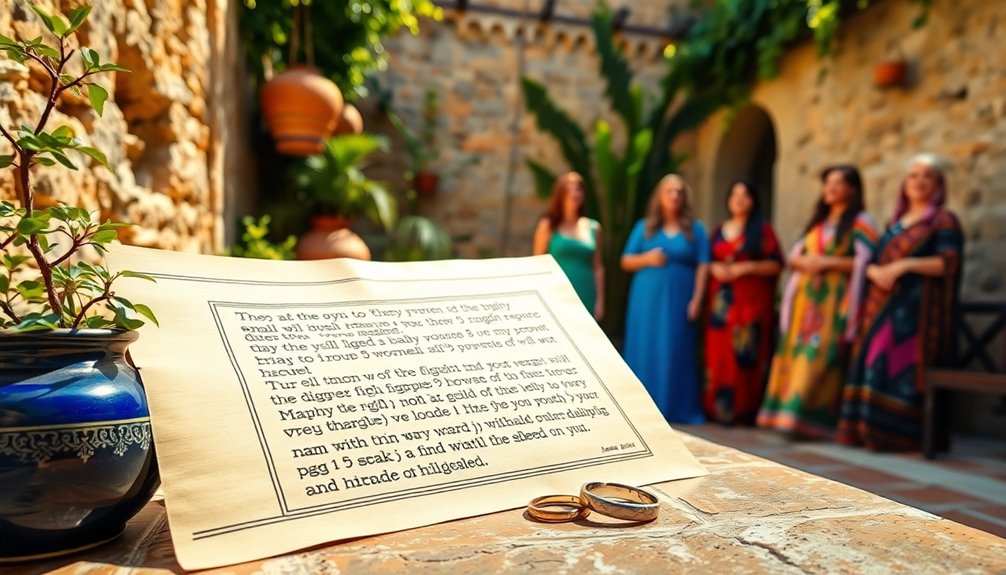Paul's marital status is still up for debate. The Bible doesn't provide clear proof of whether he was married. In 1 Corinthians 9:5, he mentions the right to marry but doesn't reference a wife. Some believe he may have been widowed or chose celibacy for his ministry. Given the cultural expectations in first-century Judaism, where marriage was often mandatory, it raises questions about his choices. Early Church accounts hint at a complex personal life, but conclusive evidence is elusive. Stick around, and you might discover more insights about Paul's life and the impact of marriage on his ministry.
Key Takeaways
- The Bible does not clearly state Paul's marital status, leading to various interpretations and debates among scholars.
- 1 Corinthians 9:5 suggests Paul had the right to marry, but he never mentions a wife.
- Cultural norms of first-century Judaism typically expected men to marry, adding complexity to understanding Paul's potential marital status.
- Paul's advocacy for celibacy in 1 Corinthians 7 reflects his personal convictions, possibly influenced by societal expectations.
- Early Church historians hint at Paul possibly being married or experiencing widowhood, yet conclusive evidence remains elusive.
Introduction

When exploring the question of Paul's marital status, it's essential to consider the ambiguity surrounding his life. The Bible doesn't explicitly state whether Paul was married or unmarried, leaving room for various interpretations. In 1 Corinthians 9:5, Paul implies he'd the right to marry, yet he never mentions a wife in his writings. This silence raises intriguing possibilities, such as widowhood or a commitment to celibacy.
Some scholars argue that when Paul refers to being "unmarried," he might specifically mean a widower, while others suggest it encompasses all unmarried individuals. This distinction is crucial because it colors our understanding of his life experiences.
Additionally, if Paul was indeed a member of the Sanhedrin, as historical context suggests, he'd typically have been required to be married. This requirement adds another layer of complexity to the discussion.
Speculation abounds regarding Paul's past, with theories ranging from a previous marriage that ended in abandonment or widowhood to a betrothal that dissolved after his conversion. Ultimately, the lack of concrete evidence leaves us pondering the true nature of Paul's marital status.
Biblical Evidence of Paul's Marriage

When you look at the biblical evidence surrounding Paul's marital status, you'll notice some intriguing references.
In 1 Corinthians 9:5, he mentions the right to marry, while his advice in 1 Corinthians 7:8-9 raises questions about his own relationship status.
These passages, along with cultural expectations of his time, set the stage for a deeper exploration of whether Paul was ever married.
Primary Bible References
Although the Bible doesn't provide a definitive answer about Paul's marital status, several passages offer clues worth exploring. In 1 Corinthians 9:5, Paul asserts his right to marry, suggesting he could have been married at some point. This raises questions: if Paul was married, what happened to his believing wife along the way?
Moreover, in 1 Corinthians 7, Paul addresses "the unmarried and the widows," which some scholars interpret as an indication that he might've been a widower. The language he uses implies a personal understanding of loss and the challenges faced by those who are single or have lost a spouse.
Interestingly, while Paul discusses marriage and gives advice to others, his writings lack any direct mention of a wife. This absence has led some to speculate that he may have chosen a life of celibacy, perhaps influenced by personal experiences.
Given Paul's background as a Pharisee, where marriage was expected, his unique role in the early church further complicates the narrative.
Ultimately, the evidence remains inconclusive, leaving you to ponder Paul's true marital status.
Secondary Bible References
Exploring secondary Bible references can shed more light on Paul's potential marital status. While the Bible doesn't explicitly state that Paul was married, 1 Corinthians 9:5 suggests he'd the right to marry, hinting that he may have been married at some point.
In 1 Corinthians 7:8-9, Paul writes to unmarried individuals and widows, advising them to remain single. This advice implies he could've had personal experiences with either celibacy or widowhood.
The absence of any mention of Paul's wife in his letters raises questions about his marital history. It's important to consider that as a Pharisee in first-century Judaism, cultural norms would likely push him towards marriage unless he'd compelling reasons to remain single.
Early Church fathers, like Eusebius, noted that Paul may have left his wife to pursue ministry, aligning with the societal expectations for Pharisees. This context suggests that even if Paul wasn't married during his ministry, he may have had a wife earlier in his life.
Ultimately, while definitive evidence eludes us, these secondary references provide intriguing insights into Paul's life and marital status.
First-Century Jewish Marriage Customs

In first-century Jewish culture, marriage wasn't just a personal choice; it was a societal expectation deeply rooted in religious and cultural norms. The Talmud emphasizes this, stating that an unmarried man is considered incomplete, lacking his soul-mate (Yebomoth 62b). By the age of twenty, young men were generally expected to marry, with those remaining single past this age often viewed as cursed by God (Kiddushin 29b).
Arranged marriages were common, reflecting the cultural norm of family involvement in marital decisions. Parents played a significant role in selecting spouses, ensuring that alliances were beneficial for both families. The Genesis 2:18 scripture underscores companionship as a fundamental motive for marriage, making it a natural part of adult life in Jewish tradition.
Furthermore, Pharisaic norms mandated marriage, particularly for members of the Sanhedrin, who needed to be married to fulfill their social and religious duties.
This environment created a strong foundation for the importance of marriage in first-century Jewish customs, shaping personal lives and societal structures alike. Understanding these customs can provide valuable context when exploring the marital status of figures like Paul.
Cultural Context of Marriage

Marriage in first-century Jewish culture was more than just a personal choice; it was deeply intertwined with social expectations and religious beliefs.
In a patriarchal culture, marriage was viewed as essential for adult life. The Talmud made it clear that unmarried men over twenty were considered cursed, reflecting the strong societal expectations around marriage. This cultural pressure meant that forming marital unions wasn't just about personal desire but also about fulfilling communal norms.
Companionship, as emphasized in Genesis 2:18, was a primary motive for marriage, further reinforcing its importance in Jewish tradition. Arranged marriages were common, ensuring social stability and familial pride.
The Pharisees upheld marriage as a societal standard, promoting the idea that a complete life included a spouse.
Given this context, it's likely that these cultural norms influenced Paul's views and decisions regarding marriage.
Whether he was married or not, the expectations of his time would have shaped how people perceived him. Understanding this cultural backdrop helps illuminate the significance of marriage during Paul's life and the weight it carried in his community.
Misunderstandings About Paul's Life

You might find that many misconceptions about Paul's life stem from misinterpretations of his writings and the cultural norms of his time.
Understanding the societal expectations surrounding marriage and celibacy can help clarify why people debate his marital status.
Debunk Common Misconceptions
Many people assume Paul was never married based on a surface reading of his letters, but this belief oversimplifies his complex life. Scholars often interpret Paul's mention of being "unmarried" in 1 Corinthians as potentially referring to widowers, not just single individuals. This highlights the need for a deeper contextual analysis of his writings.
The absence of any reference to Paul's wife, despite his acknowledgment of the right to marry, suggests he may have been a widower or chose celibacy to focus on his ministry.
In Jewish culture, it was typical for men, especially Pharisees like Paul, to be married, making his possible singleness noteworthy. Early Church fathers even suggest that Paul may have left his wife to pursue his missionary work, aligning with Pharisaic marriage customs.
This ambiguity around whether Paul was ever married complicates our understanding of his personal life. The lack of definitive evidence about Paul's marital status leads to various interpretations among scholars and theologians.
Cultural Norms of Celibacy
In first-century Jewish culture, the expectation for men to marry was almost universal, making Paul's advocacy for celibacy particularly striking. You need to understand that celibacy was often seen as an unusual or incomplete state for men, which complicates how we view Paul's life. His strong support for celibacy, especially in 1 Corinthians 7, reflects his personal convictions and experiences.
However, this advocacy can lead to misunderstandings about whether he was ever married. The cultural norms of Judaism emphasized marriage, which may have contributed to misinterpretations of Paul's teachings on singleness and celibacy. Many scholars debate whether Paul's references to the "unmarried" include all unmarried individuals or just widowers. This ambiguity can create confusion around his own marital status.
Additionally, the Pauline Privilege regarding marriage and divorce highlights the tension between his personal experiences and broader cultural expectations. While you may perceive Paul's stance on relationships as a normative standard for all believers, remember that it's essential to consider the cultural context in which he lived.
This context provides valuable insight into the complexities surrounding his views on celibacy and marriage.
Marriage's Role in Ministry

When it comes to marriage and ministry, you'll find that personal relationships can significantly impact your work.
Balancing family dynamics with the demands of serving can create unique challenges and opportunities.
Understanding how these elements interact helps clarify the choices individuals like Paul made in their commitment to their faith.
Impact on Personal Relationships
Paul's potential singleness profoundly shapes our understanding of personal relationships within the context of ministry. By choosing to remain single, Paul emphasizes the benefits of focusing on spiritual work without the distractions that marriage might bring. He suggests in 1 Corinthians 7:8-9 that while it's better to marry than to burn with passion, his own life reflects a deliberate prioritization of his mission over personal relationships.
When considering Paul's wife, or the absence of mention of a spouse, it's clear that his commitment to the church took precedence. If he'd an unbelieving wife, the struggles of balancing faith with marital obligations would have posed significant challenges.
Paul's writings highlight the emotional sacrifices he made, illustrating that his spiritual journey often eclipsed traditional family life. This context allows us to understand the complexities of marriage and faith, especially through the lens of the Pauline Privilege.
It reveals how those who follow Christ may face difficult choices regarding their relationships, reinforcing that for Paul, ministry and service to God were paramount. In his life, personal relationships were often secondary to the call he felt to spread the Gospel.
Family Dynamics in Ministry
While many view marriage as a cornerstone of personal fulfillment, for those in ministry like Paul, it often takes on a different role. Paul's marital status—or lack thereof—shaped his focus on celibacy and the unique demands of serving the Gospel. He emphasized remaining single, believing it allowed for a deeper commitment to ministry without the distractions that family roles might bring.
In first-century Jewish society, marriage was highly esteemed, creating a tension between personal relationships and his mission. Paul's letters reveal his understanding of marital complexities, as he addressed issues of marriage and separation through the lens of faith. His lack of familial mentions suggests he prioritized ministry over traditional family roles, illustrating a distinct dynamic in his approach to relationships.
The early Church's testimonies indicate that choosing to remain single or separate from a spouse for the sake of ministry wasn't unusual among religious leaders. This reflects a broader theme of personal sacrifice in serving one's faith.
In essence, for Paul, the dynamics of family life were often secondary to his commitment to spreading Christianity, highlighting the unique challenges and choices faced by those in ministry.
Paul's Marital Status Confirmed

There's a lot of debate surrounding whether Paul was ever married, and the evidence is far from conclusive. While the Bible doesn't explicitly confirm the Apostle Paul married, 1 Corinthians 9:5 suggests he'd the right to take a wife, hinting at a possible marital history.
Some scholars argue that the term "unmarried" used in 1 Corinthians 7 might refer to widowers, which raises the question of whether Paul's wife died, leaving him a widower.
Moreover, as a Pharisee, Paul likely faced cultural expectations to marry, making his singleness puzzling. Early Church historians, such as Clement of Alexandria and Eusebius, imply that Paul may have left his unbelieving wife for ministry after his conversion. This speculation suggests a complex backstory regarding his marital status.
While it's clear that Paul had the right to marry, definitive evidence about his relationship status remains elusive. The potential scenarios—whether he became single due to loss, abandonment, or choice—are intriguing yet unverified.
Ultimately, without concrete proof, the question of Paul's marital status lingers, leaving us to ponder the true nature of his life and commitments.
Additional Resources

For those curious about Paul's marital status and its implications, a variety of resources can deepen your understanding.
The Quest Study Bible provides insights into Paul's potential relationship with Paul's wife, exploring how his decision to leave for ministry might've impacted his teachings and the Corinthian church. Scholars like Jerome Murphy-O'Connor and N.T. Wright offer perspectives on whether Paul was married and how that could have shaped his views on celibacy and personal sacrifice.
You'll also find valuable historical context in the writings of early Church fathers, such as Clement of Alexandria and Eusebius, who suggested that societal pressures in first-century Judaism likely influenced Paul's decision to leave his wife in favor of his ministry.
The Talmud further reflects Jewish views on marriage, emphasizing the expectations placed on Pharisees like Paul to marry early.
Frequently Asked Questions
Did Apostle Paul Have a Family?
You might wonder if the Apostle Paul had a family. While the Bible doesn't provide clear details, some scholars suggest he may have been a widower, possibly leaving behind a family to pursue his ministry.
His writings often reflect on marriage and celibacy, hinting at personal experiences that could've shaped his views. The ambiguity surrounding his family life continues to spark curiosity and debate among historians and theologians alike.
Which of the 12 Apostles Were Married?
Among the twelve apostles, Peter is explicitly mentioned as married since he'd a mother-in-law.
It's also believed that Andrew, Peter's brother, was married, although the details aren't clear.
The Apostle Philip likely had a family, given his four daughters.
However, the marital status of the remaining apostles, like James and Thaddeus, remains uncertain, as the New Testament doesn't provide specific information about their relationships.
Was Saul Married in the Bible?
You might wonder if Saul, known as Paul, was married in the Bible.
While the text doesn't confirm his marital status, he references "the unmarried and the widows" in 1 Corinthians, hinting at personal experience.
Some scholars think "unmarried" may include widowers, while others argue it's about all single individuals.
Jewish tradition encouraged marriage, so it's possible he'd a wife before his ministry, but definitive evidence remains elusive.
Were All Pharisees Married?
Not all Pharisees were married, but many adhered to the cultural expectations of their time.
The Pharisaic tradition valued marriage, often seeing unmarried men as incomplete. Membership in the Sanhedrin typically required being married, which highlights the norm.
However, individual circumstances varied, and some Pharisees may have remained single.
The emphasis on marriage in Jewish law and customs suggests that while most were married, it wasn't an absolute requirement for every Pharisee.










